10+ Sample Camping or Camp Ground Business Plan
-
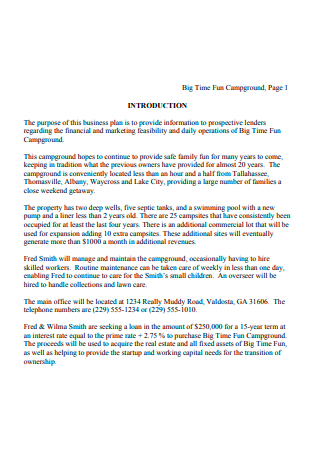
Camp Ground Business Plan Template
download now -
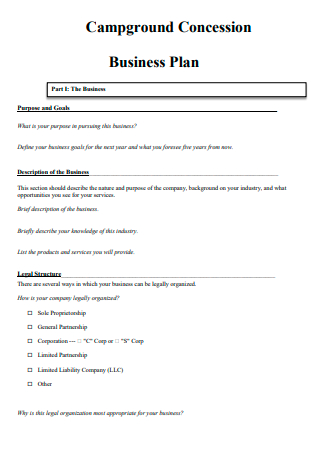
Camp Ground Concession Business Plan
download now -
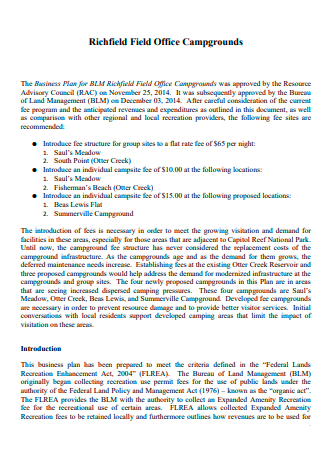
Field Office Camp Ground Business Plan
download now -
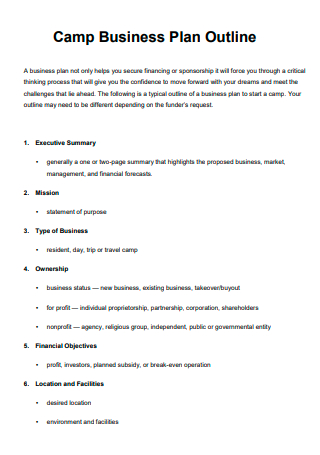
Camp Business Plan Outline
download now -
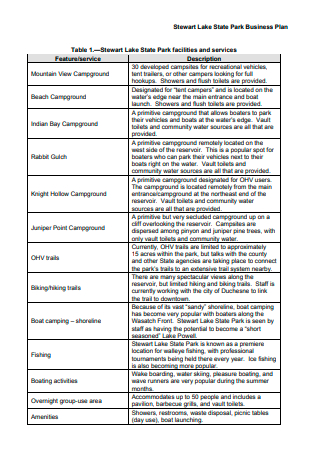
Standard Camp Ground Business Plan
download now -
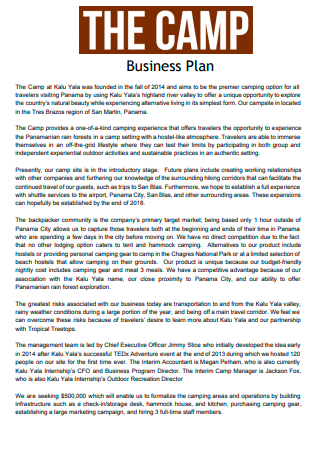
Camp Ground Business Plan Example
download now -
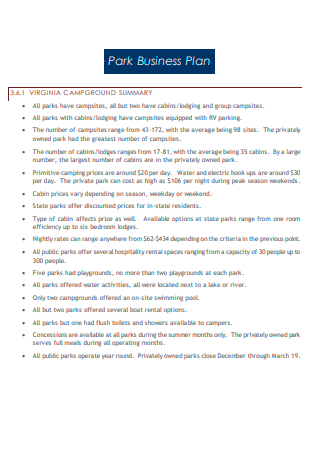
Camp Ground Park Business Plan
download now -
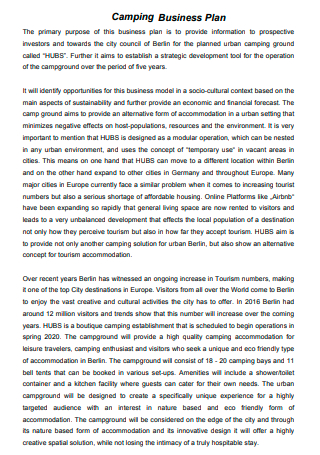
Camping Business Plan Format
download now -
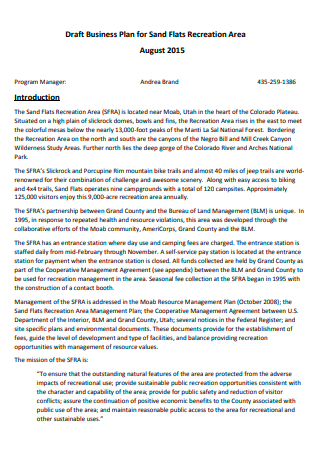
Draft Camp Ground Business Plan
download now -
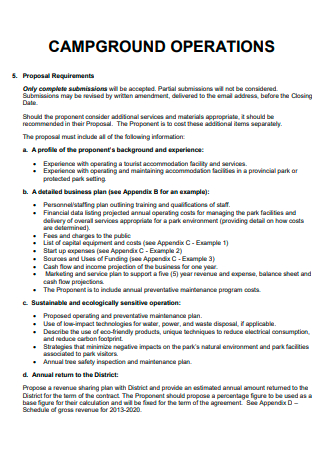
Camp Ground Operations Business Plan
download now -
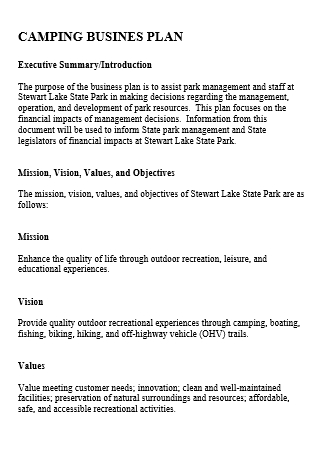
Camping Business Plan in DOC
download now
FREE Camping or Camp Ground Business Plan s to Download
10+ Sample Camping or Camp Ground Business Plan
What Is a Camping or Camp Ground Business Plan?
What Are Campgrounds?
Things To Prepare for Camping
Elements Involved in Making a Camping or Campground Business Plan
How To Make a Camping or Campground Business Plan
FAQS
What Should I Look for a Campground?
Do Campgrounds Bring in a Lot of Money?
What Characteristics Characterize a Good Camping Site?
What Is a Camping or Camp Ground Business Plan?
A camping or campground business plan is a comprehensive document that covers the business structure, financial costs, strategy, and services of a camping ground owned by a specific individual or organization by researching targeted market trends and projecting financial flow based on expected market growth and reception. A camping business plan will also address the pricing and promotion strategy, as well as the beginning cost of creating the campsite and the predicted profit and loss in the following years.
The campground business serves as a temporary lodging facility, away from the hustle and bustle of cities and the noise of the street, and instead is surrounded by the tranquility of nature and the sounds of animals. An RV business plan is a type of camping business plan. Some camping companies provide RV vans instead of tents for campers to use as housing, and rv-camping.org even created a rv camping checklist to guarantee that campers do not forget what to bring.
What Are Campgrounds?
A campground is an outdoor area used for camping that is typically surrounded by and close to nature. Campgrounds provide amenities and tools that campers can use rather than bringing their own; nevertheless, they must pay for their stay. Such equipment often consists of the items required for cooking and cleaning themselves, such as grills and clean drinkable water, as well as spaces such as restrooms. Some campgrounds also provide activities for campers to participate in.
Campgrounds are a business that follows safety and has their own safety management plan for potential threat since they provide a safe and clean environment that one cannot receive when camping in the wild. Camp owners are also responsible for maintaining and inspecting equipment on a regular basis to guarantee that the future campers who use it are not in danger and that safety observation is a prioritize. They are also responsible for keeping the campgrounds clean and safe.
Things To Prepare for Camping
Camping is only enjoyable if done correctly. And the easiest approach to ensure you don’t forget anything is to create a camping checklist that you can use. Consider it like a travel itinerary. Aside from preparing a list, here are some things you should prepare before camping.
Elements Involved in Making a Camping or Campground Business Plan
There are multiple advantages to creating a campsite business plan initially. First and foremost, research is required before printing any campground business plan pdf and presenting it to interested parties. And, just to make sure you’ve covered all of your bases, let’s go over the elements of creating a campground business plan.
How To Make a Camping or Campground Business Plan
Aside from taking notes on the key elements you’ll need to incorporate into your camp, knowing how to write or make it in the first place is a different story. So, here are the stages to creating a camping or campground business plan:
Step 1: Introduction and Cover Page
Giving your business plan a name is already an introduction to what investors might anticipate to find inside. Include the place, and the date, as well as your name and the name of your camp. The executive summary of your company is located below all of that giving a concise outline of your company plan’s components as well as showing how it will be successful. Following that is the introduction, in which you can gradually introduce the readers to your goals and objectives, as well as why you believe the market would be interested in your business. The introduction could incorporate an example of your previous success in other enterprises, lending credence to your previous statements and demonstrating your commitment to making it successful.
Step 2: Services
List or write down the services and activities you want to offer inside your camp to encourage your readers and investors to be even more convinced about the success of your camp or how it would be a sound investment. This will make it simpler to persuade investors if they can see that there is some truth in your comments, such as displaying other successful businesses, and your decision-making will also correlate with the success of this business. This is the section where you should start displaying what you have that other do not, or demonstrating the distinct value your camp provides. Pricing and any discounts you may offer for specific events and days are included in the services section. It’s also a good idea to highlight any future possible services that you want to include.
Step 3: Financial and Marketing Strategy
The inception and construction costs of your campsite to develop into a habitable and safe environment are only a portion of the financial expenses for your camping ground. The cost of hired people as well as the cost of developing facilities must be considered. That is, predicted loss and profit in the first and subsequent years must be included in the financial section. The marketing plan consists of the concepts and promotional strategies you will use to get traction in the media and market. Marketing strategy is critical, especially for start-up companies or unpopular business owners who are still trying to establish themselves in the market. It is best to conduct a campground financial analysis in order to present a solid financial goals to the investors.
Step 4: Risk Management
There are always risks in business that are difficult to avoid. For example, what if your camp is having difficulty gaining traction and establishing itself in the targeted market, putting investors at danger of financial loss? Liabilities and safety precautions are also part of risk management in the event of an accident or natural disaster. High-risk activities that you intend to offer must have their own risk management in order to assure their safety and success. An accident would be a higher loss for investors and owners alike, and it would give your camp a bad reputation.
Step 5: Make a Presentation
Making a detailed presentation with visuals and data is part of putting your business plan into action. Everything you said and included in your business plan should be effectively summarized in the presentation.
FAQS
What Should I Look for a Campground?
When looking for a campground to stay at, there are a few things you should keep in mind. Location and seclusion, for example, are important considerations while selecting a camping place. Of course, campers desire the privacy that the city does not provide and want to rest, so location is critical. As well as its accessibility, particularly under adverse weather situations. Another consideration is the level of security it guarantees and provides, as well as whether or not they have contingency plans in place in the event of such an incident. Also, if you’re interested in camping activities, it’s a good idea to look them up first before traveling.
Do Campgrounds Bring in a Lot of Money?
Campgrounds, particularly those with a variety of activities and open stores, are quite profitable for the owner. And a good camping spot would quickly win the commitment of seasoned campers and hikers, and word would quickly spread across the circle. As a result, a campground that understands its market is profitable.
What Characteristics Characterize a Good Camping Site?
A nice camping ground is one that is convenient for campers. Where it’s rather simple to get in and out. Campgrounds acquire a lot of customers if they are cool, especially in the summer, and provide good shade for campers. Safety and security are of the utmost importance.
Campers see the campground as a temporary haven and a place to unwind. You can take notes on what to incorporate for a successful camping business by downloading the above-mentioned sample camping or camp ground business plan templates! A good camp is required to be a business champ.
